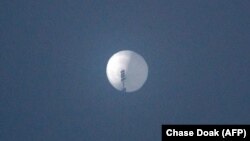A top U.S. defense official is dismissing China’s use of surveillance balloons as a distraction, calling them inconsequential when compared to the larger problem posed by Beijing’s increasing ability to militarize space.
China’s use of spy balloons has grabbed headlines since the Pentagon announced it was tracking one of the high-altitude devices as it traveled across the continental United States this past February.
Since then, the United States has shot down one Chinese balloon and a handful of other suspicious high-altitude objects, at times using advanced weaponry and U.S. officials have even acknowledged the balloon was able to gather some information around sensitive military sites.
But Air Force Secretary Frank Kendall said Monday, in some ways, China’s use of balloons, which Beijing has described as weather balloons, is a distraction.
"They have a very aggressive intelligence collection program. The balloons are a very small part of that and not highly consequential," Kendall told reporters during a briefing to the Defense Writers Group in Washington.
What worries him more, Kendall said, is higher up.
“The space part of it is very significant and very consequential," he said. "They're linking their space-based capabilities to their operational forces.”
Other U.S. officials have likewise warned of China’s advances in space.
"China sees space as a potential vulnerability for the United States," said Doug Wade, head of the Defense Intelligence Agency’s China Mission Group, this past March.
"There's a variety of space and counter-space assets or capabilities in China that worry us a lot," Wade said, calling Beijing's space program, "second only to the United States."
The U.S. chief of space operations, General Chance Saltzman, likewise warned about Beijing growing prowess, calling China “our most substantial threat into and from space.”
Kendall on Monday said specifically it is China’s growing ability to use its satellites to track U.S. troops and assets that has him “very concerned.”
"A big part of that operational capability is surveillance, reconnaissance, targeting … to do things like try to target aircraft carriers, trying to target mobile units, ground units of various types," he said. "It's a huge efficiency enhancement for them potentially."
Despite pleas from officials like Kendall for lawmakers to focus on China’s space capabilities, there has been a push by some lawmakers to address the potential threat from high-altitude balloons, some of it in line with requests for equipment and funding from U.S. Northern Command.
“The [U.S. Northern Command commander] has told us that he has additional unfunded requirements for Air Force over the horizon and long-range expeditionary radars,” Democrat Jon Tester, chairman of the Senate Defense Appropriations Subcommittee, said during a hearing last month.
“We need to provide the resources, and I think this committee on both sides of the aisle wants to make sure our nation is safe and provide the resources to do that,” Tester added.
The Air Force’s Kendall called on lawmakers to pass a defense budget on time and support modernization efforts, including reforms that would allow the service more flexibility to better respond to China’s advancements.
"The threat to our airbases, the threats to our carriers, their air superiority drive … have all been going on for quite some time and we have not responded, I think, as quickly as we should have," he said, adding that in some cases, "We're giving away over a year to China for no good reason.”






